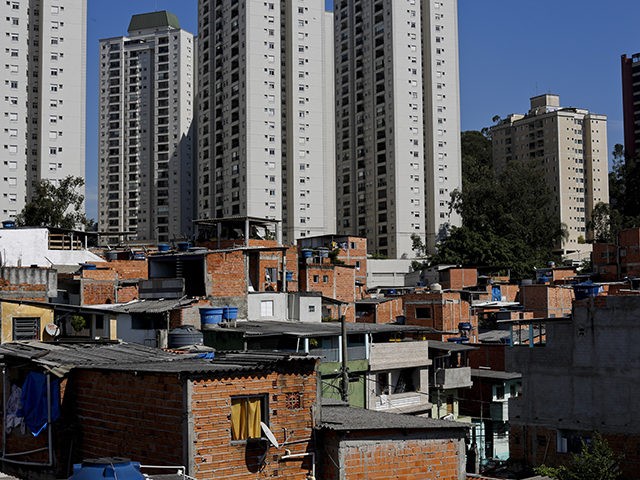Mistrusting the state to provide adequate healthcare services amid the rising threat of the Chinese coronavirus, a Brazilian slum has hired private doctors to treat residents.
The Paraisopolis residents’ association recently contracted a private medical service — including three ambulances, two doctors, and two nurses — to treat local coronavirus patients.
Sao Paulo’s largest slum, or “favela,” Paraisopolis has about 120,000 residents. Sao Paulo’s population of over 12 million is currently on lockdown due to the Chinese coronavirus. According to the private medical team hired to treat Paraisopolis coronavirus patients, the favela has six confirmed cases so far and another 60 suspected cases.
Emerson Barata, one of the slum’s private doctors, warned on Thursday, “It’s going to get a lot worse [in the slum]. The surge hasn’t hit yet.”
A densely populated favela, Paraisopolis’s conditions provide the Chinese coronavirus with fertile breeding grounds: crowded, sanitation-poor, and a lack of health services. Additionally, many of the slum’s residents work for wealthy families in a nearby affluent neighborhood, ground zero of Brazil’s coronavirus outbreak.
Brazil’s elite were the first to contract the Chinese coronavirus and bring it home after traveling abroad. Paraisopolis residents who have tested positive for the coronavirus so far include two people who work in a nearby private medical facility, which diagnosed the first case in Latin America, plus a live-in nanny.
The Chinese coronavirus has been known locally as the “disease of the rich.” Now, it is set to hit the poor the hardest. “Favelas are going to be hit the worst,” a Paraisopolis private doctor said.
Brazilian President Jair Bolsonaro has dismissed the Chinese coronavirus as “a little flu.” The president’s description of coronavirus quarantine measures as “hysteria” and calls for the nation’s governors to let people return to work have been criticized.
Bolsonaro’s lax attitude toward Brazil’s coronavirus measures contrasts with that of the medical team hired by Parasisopolis, who refer to their preparations to tackle the outbreak as akin to “war.”
Celia Parnes, the Secretary of Social Development for Sao Paulo, said the government was concerned about the “speed of contagion in the favelas.” She added that authorities were working to assist Paraisopolis with Chinese coronavirus aid, including subsidized meals and debt relief, as many will lose their jobs due to Sao Paulo’s lockdown.
Paraisopolis residents reportedly doubt the government’s ability to provide adequate healthcare to Brazil’s poor in general, let alone amid the Chinese coronavirus crisis.
“The places that are already neglected by the state will be neglected even more,” said Barata.
According to locals, there is no access to water in Paraisopolis after 8 p.m. and trash often piles up uncollected along the slum’s alleys.
Brazil’s largest drug gang, the First Capital Command (PCC), controls Paraisopolis with de facto authority. A phenomenon throughout the country’s favelas, Brazil’s slums are largely ruled by gang leaders and militia authority. PCC has bestowed its blessing upon the slum’s private medical team, which operates with its permission.
In a similar instance in a Rio de Janeiro last week, gangs and militias running slums imposed their own social distancing mandates and strict curfews on favela residents in an effort to stave off the spread of the Chinese coronavirus, citing a lack of preparedness by state authorities.
Brazil is Latin America’s worst-affected nation by the coronavirus so far. At press time on Friday, Brazil had 8,076 infections and 329 deaths from the Chinese coronavirus.

COMMENTS
Please let us know if you're having issues with commenting.